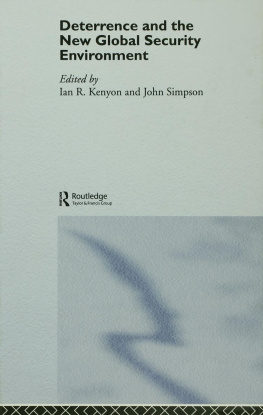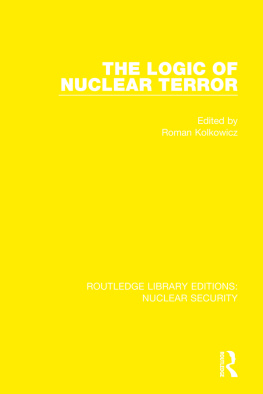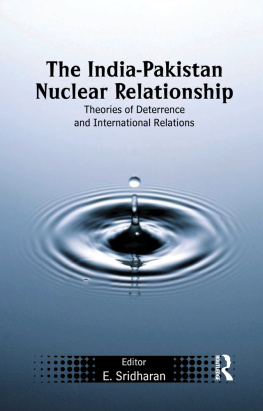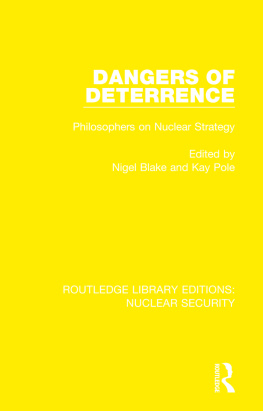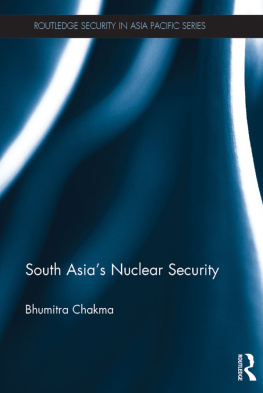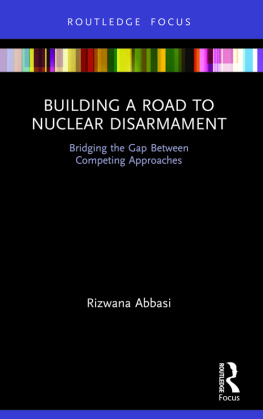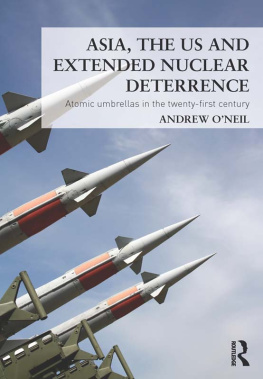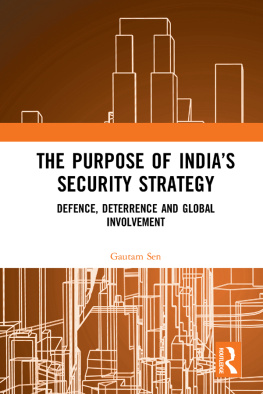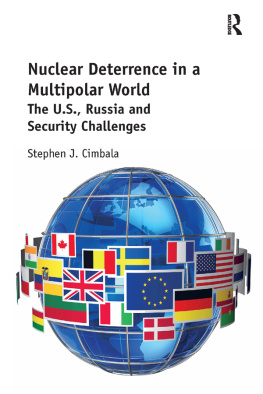Deterrence and the New Global Security Environment
Nuclear deterrence was the central organising mechanism for international security relations in the second half of the 20th Century. It effectively stabilised the security relations between the main protagonists of that period, the USA and the USSR and enabled them to be institutionalised through bilateral arms control agreements. This profound antagonism between the established nuclear-weapon states has subsided.
However in the 21st Century we are faced with new fears, prompted by a new global security environment characterised by the proliferation of all types of WMD and their delivery systems, as well as defensive systems. It appears to centre on regionally based sets of security problems, such as the Middle East and the threat from Iran and the threat posed by international terrorist organisations. In this environment the central role of deterrence, both nuclear and otherwise, appears to have diminished. This collection offers an important contribution and comprehensive analysis of the problems faced from a wide range of national perspectives and considers the place of deterrence in the international security relations of the 21st Century.
This book was previously published as a special issue of Contemporary Security Policy.
Ian R. Kenyon is a visiting Senior Research Fellow at the Mountbatten Centre for International Studies, University of Southampton, UK.
John Simpson is a Professor of International Relations at the University of Southampton, UK and Director of the Mountbatten Centre for International Studies.
Deterrence and the New Global Security Environment
Edited by Ian R. Kenyon and John Simpson
First published 2006
by Frank Cass, an imprint of Taylor & Francis 2 Park Square,
Milton Park, Abingdon, Oxon, OX14 4RN
Simultaneously published in the USA and Canada by Routledge
270 Madison Ave, New York, NY 10016
Routledge is an imprint of the Taylor & Francis Group
2006 Taylor & Francis Ltd
Typeset in Times by Techset Composition Limited
Printed and bound in Great Britain by Antony Rowe Ltd,
Chippenham, Wiltshire
All rights reserved. No part of this book may be reprinted or reproduced or utilised in any form or by any electronic, mechanical, or other means, now known or hereafter invented, including photocopying and recording, or in any information storage or retrieval system, without permission in writing from the publishers.
The publisher makes no representation, express or implied, with regard to the accuracy of the information contained in this book and cannot accept any legal reponsibility or liability for any errors or omissions that may be made.
British Library Cataloguing in Publication Data
A catalogue record for this book is available from the British Library
Library of Congress Cataloging in Publication Data
A catalog record for this book has been requested
ISBN10: 0-714-65498-1 (hbk)
ISBN10: 0-714-68398-1 (pbk)
ISBN13: 978-0-7146-5498-0 (hbk)
ISBN13: 978-0-7146-8398-0 (pbk)
Contents
The Mountbatten Centre for International Studies in the School of Social Science of the University of Southampton, England, was established in 1990 to explore significant trends in international security relations, including issues in global non-proliferation. In 1999, as part of its commitment to the study and support of the international regimes for the control of the proliferation of weapons of mass destruction (WMD), particularly the Nuclear Non-Proliferation Treaty, the Centre set up a project known as the Mountbatten Centre International Missile Forum to study, and to provide a forum for international expert discussion of the most common delivery system for WMD, missiles, including both the drivers for their acquisition and the means to control their proliferation. As part of the preparations for the 2002 Forum meeting it was decided to ask a group of scholars to consider, ten years after the end of the Cold War, whether the most prominent late-twentieth-century concepts of deterrence, such as Mutually Assured Destruction, still had validity and what were the new problems facing current strategic thinkers. The resulting papers, written by a group of scholars and practitioners from around the world, offer insights into how strategic thinking has evolved over the past decade and the many different strategic challenges confronting states in different regions of the world. Following an unforeseen delay in publication, the authors updated their papers, where appropriate, for this publication.
TIMOTHY GARDEN Lord Timothy Garden is visiting professor at the Centre for Defence Studies at King's College London, where his current research is on transatlantic security issues and on international terrorism. He was a pilot in the Royal Air Force, was assistant chief of the UK defence staff and then the air marshal commandant of the Royal College of Deference Studies in London. After retirement from the military, he went on to be Director of the Royal Institute of International Affairs at Chatham House. He writes and broadcasts on security policy issues.
After 1945, the world learned to live in the shadow of nuclear catastrophe. Deterrence theory was developed in think tanks; the nuclear powers responded with ever more diverse methods of nuclear weapon delivery. Deterrence preserved an uneasy peace between the West and the Soviet Union. Many hoped that the end of the 20th Century would see a decline in the importance of nuclear forces.
Arms control and other measures have had real successes in slowing the spread of nuclear weapons. Yet there remained a hard core of countries that still sought to join the nuclear club: Israel, India and Pakistan succeeded. Others, notably North Korea and perhaps Iran continue such development work. And for those that find the nuclear path too difficult, biological weapons offer an easier route to strategic capability. Already, we have been close to nuclear conflict between India and Pakistan. Yet deterrence seems to have continued to shape their actions.
In the United States, the debate over missile defences showed the growing concern over reliance on deterrence for national safety. The terrorist attacks on Washington and New York of 11 September 2001 have brought a heightened sense of insecurity. While deterrence can work against hostile powers, how can it influence the actions of terrorists prepared to die for their cause? The greatest nightmare is that such fanatical terrorists might themselves gain access to weapons of mass destruction. The 2002 USA National Security Strategy looks to a more proactive doctrine with pre-emptive elimination of the threat replacing a dependence on deterrence.
This volume is published at a key moment. The reader can access the role of deterrence in so many areas of potential conflict. While new strategies of defence and pre-emption may have a part to play, the underlying requirement for deterrence in a nuclear world remains.
Wyn Q. Bowen is Director of Research, Defence Studies Department, King's College London, at the UK Joint Services Command and Staff College (JSCSC), and Deputy Director (Research Coordination) of the International Policy Institute at King's. Prior to joining King's in July 1997, he spent two years as a Senior Research Associate of the Center for Nonproliferation Studies, Monterey Institute of International Studies, California. He has served as Specialist Advisor to the House of Commons Foreign Affairs Committee for inquiries into 'The Decision to Go to War in Iraq' (2003) and 'Weapons of Mass Destruction' (2000). In 1997-98, he served as a weapons inspector on several missile teams in Iraq with the UN Special Commission. He has written widely on security-related issues most recently including, with Joanna Kidd, 'The Iranian Nuclear Challenge', International Affairs, March 2004.

